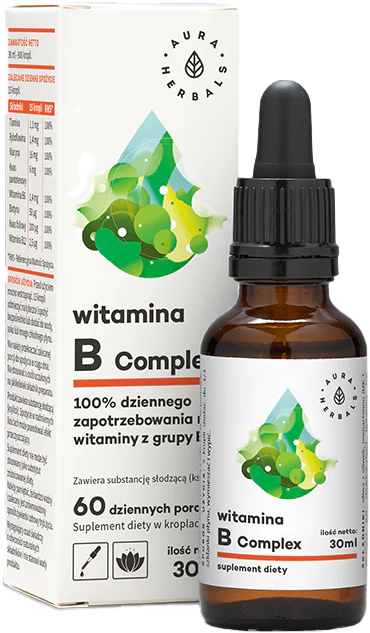Pantothenic acid - what it is, effects, sources, excess, in pregnancy
Pantothenic acid is one of the most important vitamins. What does it do? What is the manifestation of its deficiency? Where does it occur? Check it out!


Learn more about our editorial process
.

Learn more about our editorial process
.

Learn more about our editorial process
.

Learn more about our editorial process
.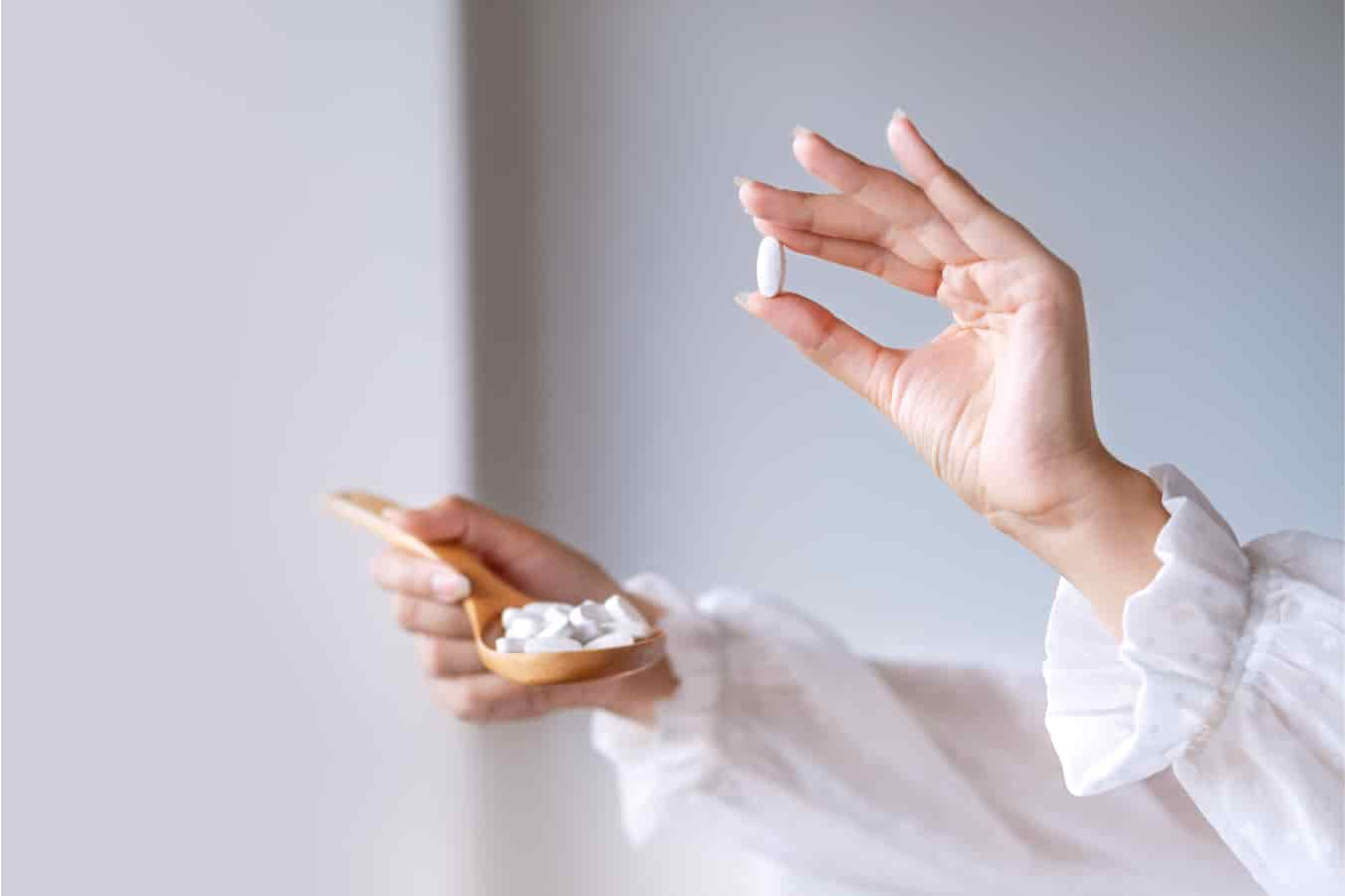
Why you can trust us
Articles on Natu.Care are written based on scientific research, data from government websites and other reliable sources. The texts are written in cooperation with doctors, nutritionists and other health and beauty experts. Articles are reviewed before publication and during significant updates.
.Learn more about our editorial process
.Information about advertisements
Content on Natu.Care may contain links to products from the sale of which we may receive a commission. When creating content, we adhere to high editorial standards and take care to be objective about the products discussed. The presence of affiliate links is not dictated by our partners, and we select the products we review ourselves completely independently.
.Learn more about our terms and Conditions
.Pantothenic acid. Sounds corny, doesn't it? In reality, it is nothing more than vitamin B5. Together with Lukasz Borula, MSc in pharmacy, I have put together some essential information about pantothenic acid for you.
Want to know what its sources are? Or are you interested in the effects of pantothenic acid? Not sure what its deficiency or excess manifests itself as? You will find the answers to these and other questions in this article!
Please read on.
Description of contents:
.- What is pantothenic acid? .
- Pantothenic acid - effects .
- Pantothenic acid requirements .
- Sources of pantothenic acid .
- Pantothenic acid deficiency .
- Pantothenic acid - excess .
- Pantothenic acid supplementation .
- Pantothenic acid in pregnancy .
- Interactions of pantothenic acid with drugs .
- Summary .

Odkryj, co dla Twojej urody może zrobić Natu.Care Glow Stories
Skóra, włosy, paznokcie: Glow Stories
Wesprzyj prawidłowy stan skóry, włosów i paznokci i ochroń komórki przed stresem oksydacyjnym!
Sprawdź cenę
Glow Stories to formuła aktywnych składników, które zostały starannie dobrane wedle najnowszych badań naukowych. Znajdziesz w nich biotynę, cynk i miedź pielęgnujące zdrowie włosów i promiennej cery. Ponadto cynk jest odpowiedzialny także za zachowanie zdrowych paznokci. Mądra suplementacja zadba o Twoje piękno od środka.Julia Skrajda, dietetyk kliniczny
See also:
- B vitamins [properties + where they occur] .
- Vitamin B1 (thiamine) [properties + where it occurs] .
- Vitamin B2 [properties + where it occurs] .
- Vitamin B3 [properties + where it occurs]
- Niacin [what it is + effects and side effects] .
- Vitamin B6 [where it occurs + deficiency, excess and properties]
- Biotin [what it is + properties and side effects] .
- Biotin for hair [what it gives and effects + ranking]
- Vitamin B9 (folic acid) [what it is + properties and excess] .
- Vitamin B12 [what it helps with + where it occurs] .
- Vitamin C [properties + dosage] .
- Magnesium [what it is in + properties] .
- Best magnesium [ranking + pharmacist's opinion] .
What is pantothenic acid?
.
Pantothenic acid is also known as vitamin B5 . It is a water-soluble vitamin of the B group, responsible for producing blood cells, as well as converting food into energy. Pantothenic acid is essential for antibody production and healthy growth. It can be found in most foods, such as liver and eggs.
Pantothenic acid is not only an interchangeable name for vitamin B5, but also one of its components. Pantothenic acid is the generally inactive form of coenzyme A.
 .
.
Julia Skrajda Clinical nutritionist
.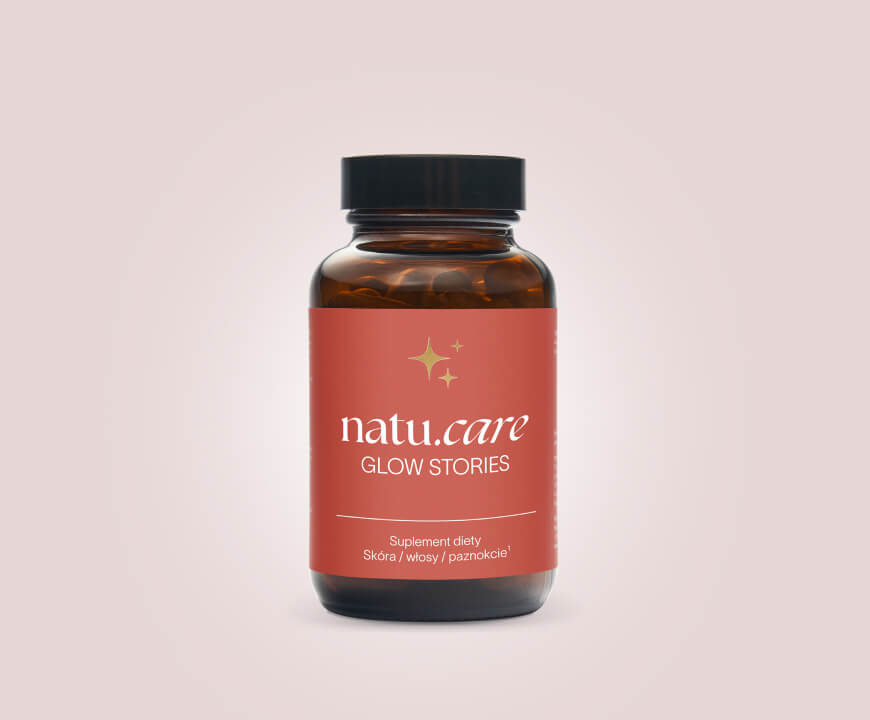
Glow Stories - for healthy skin, hair and nails
.Product with high-quality folic acid Quatrefolic®, bamboo shoot extract and ingredients that have a positive effect on skin, hair and nails.
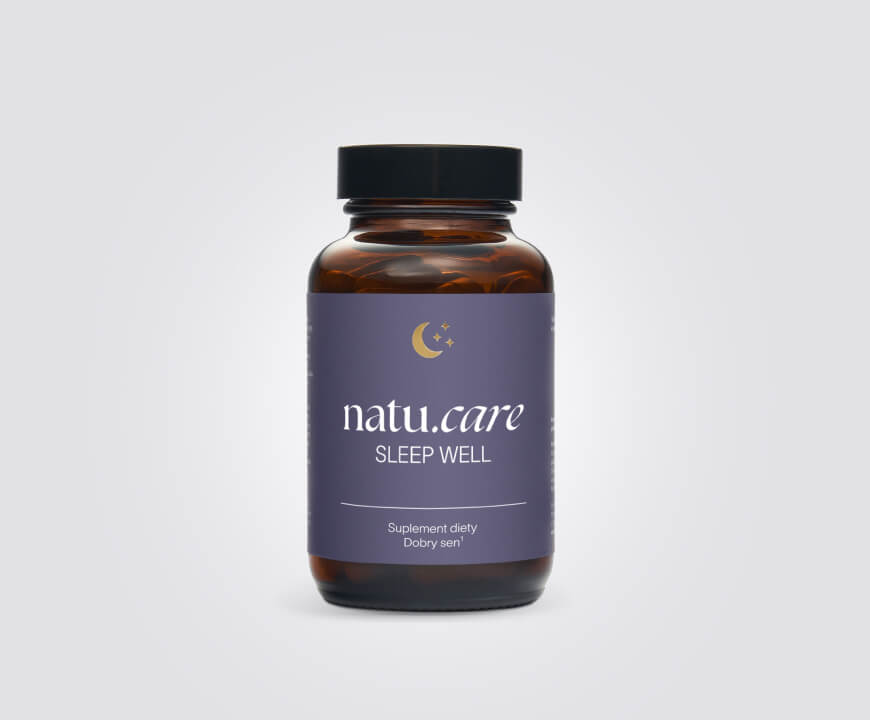
Sleep Well - dietary supplement for good sleep and tranquillity
.Sleep Well is a calming and relaxing dietary supplement with a standardised complex of CALMOMIX® herbal extracts and high-quality magnesium.
Pantothenic acid - effects
.
Pantothenic acid influences numerous reactions in our body. It is considered by many to be the most important vitamin. What does pantothenic acid affect?
.
Digestive system
.
Pantothenic acid supports the digestive systemand. Its deficiency leads to stomach problems. Furthermore, pantothenic acid positively affects the absorption of other vitamins, especially vitamin B2.
.
skin
.
Research suggests that pantothenic acid moisturises the skinand. It may also be helpful in the treatment of acne. After 12 weeks of supplementation in people with this condition, the positive effects of taking pantothenic acidand have been noted.
The condition of the skin is also dependent on collagen. Want to read more about it? How about jumping straight into an article about facial collagen? I also have an article for you about the most powerful collagen and collagen insufficiency. The choice is yours!
Stress
.
All B vitamins play a key role in combating chronic stressand. Pantothenic acid is responsible for regulating cortisol (the stress hormone) levels. As a result, it has a positive effect on stress management.
In addition to regulating cortisol levels, pantothenic acid also affects the levels of other steroid hormones, namely testosterone, oestradiol and progesterone, as well as the neurotransmitters serotonin and dopamine. Thanks to the effect of pantothenic acid on cortisol, we see a regulation of stress levels. Nevertheless, a deficiency of this vitamin will affect changes in the levels of the aforementioned hormones, which are relevant, for example, in PCOS..
 .
.
Julia Skrajda Clinical nutritionist
..
Coenzyme A
.
Pantothenic acid influences the synthesis of coenzyme A . Coenzyme A is responsible for the conversion of foods taken in meals into fatty acids (the main source of energy), as well as the production of good cholesterol .
.
It is also responsible for transporting fatty acids to the mitochondria (the cells responsible for distributing oxygen in the body). As a result, it has a positive effect on the management of fatigue.
Furthermore, coenzyme A is essential for the liver to work properly. Thanks to it, it is able to safely metabolise certain drugs. It is worth mentioning that coenzyme A also has antioxidant and regenerative effects. Thanks to these properties, it is effective against acne, among other things.
.
Coenzyme A is the active form of pantothenic acid, and its acetyl derivative, acetyl CoA, is essential for the normal functioning of the nervous system. It is from acetyl CoA that acetylcholine, the neurotransmitter on which cognitive functions in the body depend, is formed. Among other things, it is acetylcholine that is responsible for the ability to concentrate and memory. Pantothenic acid deficiency leads to coenzyme A deficiency. This results in a lack of the active substance responsible for these processes..
 .
.
Julia Skrajda Clinical nutritionist
..
What else does pantothenic acid work for? Master of Pharmacy Luke Borula answers:
- Hair. Pantothenic acid imparts shine, accelerates regeneration, and improves hair growth.
- Pantothenic acid is also used to promote hair growth.
- Nails. Pantothenic acid has a positive effect on regeneration of damaged nails.
.
- Resistance. Pantothenic acid's active involvement in the antibody production process makes pantothenic acid a boost to the immune system.
.
- Mucous membranes. Pantothenic acid significantly improves the recovery of damaged mucous membranes.
.
Dr Jacob's Melatonin + B12
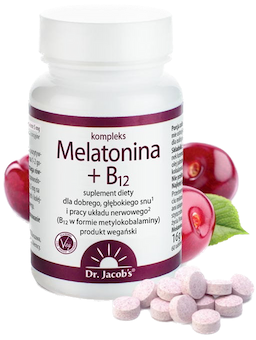
- Active ingredients: melatonin, vitamin B12
- Form: sucking pastilles .
- Dosage: 1 lozenge per day .
- Sufficient for: 60 days .
Product description
Sweet pleasures in the evening are rather forbidden. Well, unless it's cherry lozenges with melatonin and vitamin B12, whichóre going to improve the quality of your sleep.
One tablet in the evening will shorten your sleep time and stop you waking up.
One tablet in the evening will shortenóyour time to fall asleep and stop you waking up during the night. The addition of vitamin B12 will improve the functioning of the nervous system, making you even better rested.
The following tablets will help to improve the quality of your sleep.
Pros and cons
Sweet pleasures in the evening are rather forbidden. Well, unless it's cherry lozenges with melatonin and vitamin B12, whichóre going to improve the quality of your sleep.
One tablet in the evening will shorten your sleep time and stop you waking up.
One tablet in the evening will shortenóyour time to fall asleep and stop you waking up during the night. The addition of vitamin B12 will improve the functioning of the nervous system, making you even better rested.
The following tablets will help to improve the quality of your sleep.
Additional information
Sweet pleasures in the evening are rather forbidden. Well, unless it's cherry lozenges with melatonin and vitamin B12, whichóre going to improve the quality of your sleep.
One tablet in the evening will shorten your sleep time and stop you waking up.
One tablet in the evening will shortenóyour time to fall asleep and stop you waking up during the night. The addition of vitamin B12 will improve the functioning of the nervous system, making you even better rested.
The following tablets will help to improve the quality of your sleep.
User review
Sweet pleasures in the evening are rather forbidden. Well, unless it's cherry lozenges with melatonin and vitamin B12, whichóre going to improve the quality of your sleep.
One tablet in the evening will shorten your sleep time and stop you waking up.
One tablet in the evening will shortenóyour time to fall asleep and stop you waking up during the night. The addition of vitamin B12 will improve the functioning of the nervous system, making you even better rested.
The following tablets will help to improve the quality of your sleep.
SOLGAR natural vitamin B12
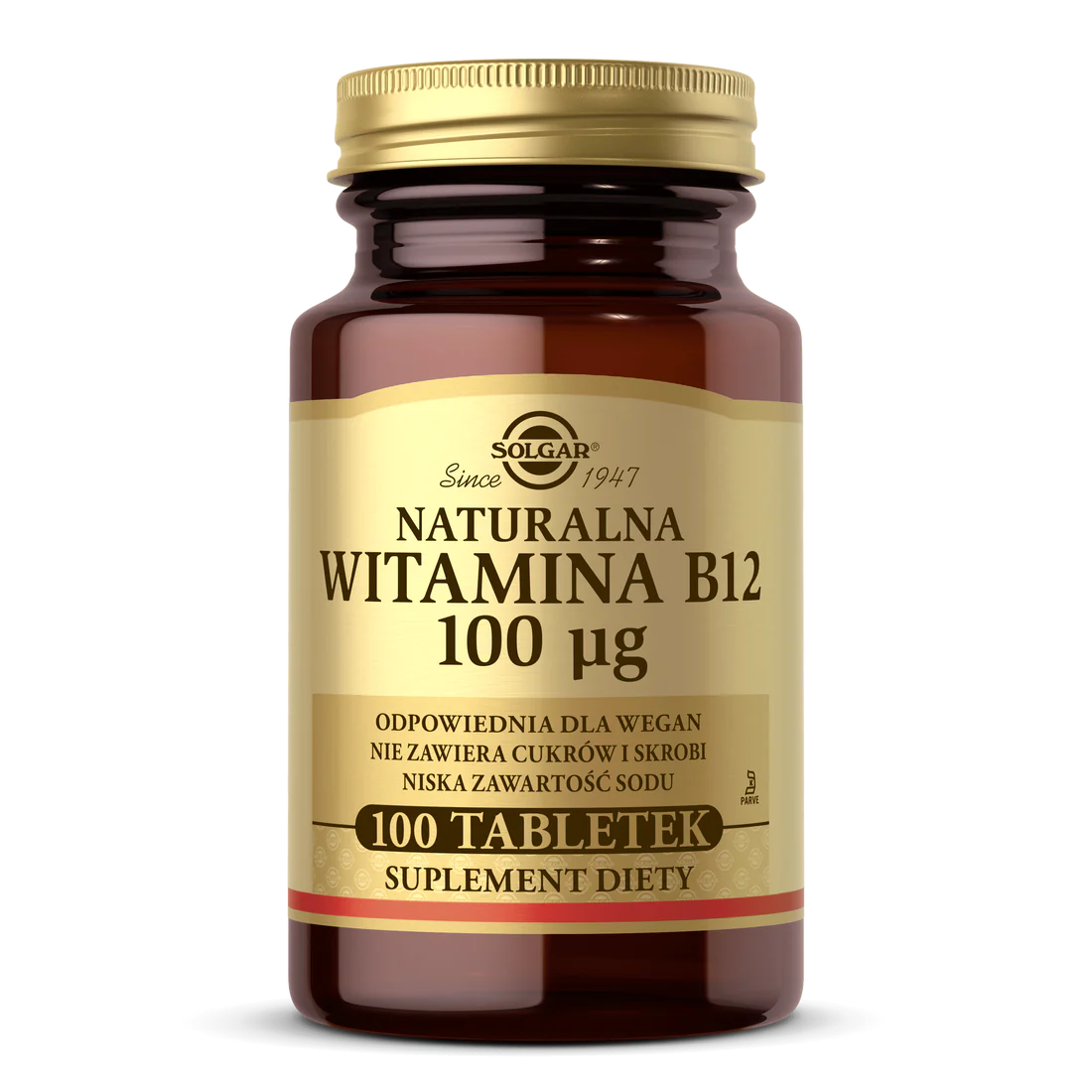
- Active ingredients: vitamin B12
- Form: tablets .
- Packaging: 100 tablets .
- Dose: 1 tablet daily .
- Sufficient for: 100 days .
Product description
The dietary supplement is a source of valuable vitamin B12 in a form that is easily absorbed by humans - cyanocobalamin. This biologically active form of vitamin B12 has many very important protective functions for the body.
Vitamin B12 supports the functioning of the immune system. It also contributes to reducing feelings of fatigue and tiredness. Its important function is also to take part in the metabolism of homocysteine, an amino acid thatós naturally formed in the human body.
Vitamin B12 is a very important protective function.
Pros and cons
The dietary supplement is a source of valuable vitamin B12 in a form that is easily absorbed by humans - cyanocobalamin. This biologically active form of vitamin B12 has many very important protective functions for the body.
Vitamin B12 supports the functioning of the immune system. It also contributes to reducing feelings of fatigue and tiredness. Its important function is also to take part in the metabolism of homocysteine, an amino acid thatós naturally formed in the human body.
Vitamin B12 is a very important protective function.
Additional information
The dietary supplement is a source of valuable vitamin B12 in a form that is easily absorbed by humans - cyanocobalamin. This biologically active form of vitamin B12 has many very important protective functions for the body.
Vitamin B12 supports the functioning of the immune system. It also contributes to reducing feelings of fatigue and tiredness. Its important function is also to take part in the metabolism of homocysteine, an amino acid thatós naturally formed in the human body.
Vitamin B12 is a very important protective function.
User review
The dietary supplement is a source of valuable vitamin B12 in a form that is easily absorbed by humans - cyanocobalamin. This biologically active form of vitamin B12 has many very important protective functions for the body.
Vitamin B12 supports the functioning of the immune system. It also contributes to reducing feelings of fatigue and tiredness. Its important function is also to take part in the metabolism of homocysteine, an amino acid thatós naturally formed in the human body.
Vitamin B12 is a very important protective function.
Aura Herbals Vitamin B Complex drops
Product description
Vegan drops with a complex of B vitamins. A daily serving covers 100% of the requirement for these vitamins. B vitamins are important for the proper functioning of the body, especially for the nervous system, metabolism and energy production.
Pros and cons
Vegan drops with a complex of B vitamins. A daily serving covers 100% of the requirement for these vitamins. B vitamins are important for the proper functioning of the body, especially for the nervous system, metabolism and energy production.
Additional information
Vegan drops with a complex of B vitamins. A daily serving covers 100% of the requirement for these vitamins. B vitamins are important for the proper functioning of the body, especially for the nervous system, metabolism and energy production.
Requirement for pantothenic acid
.
The daily requirement for pantothenic acid depends on age. According to the nutritionist, there is an increased need for pantothenic acid in people who participate in sports. What are the dietary standards for the Polish population?"
.
|
Age . |
Daily pantothenic acid requirements . |
|
0-6 months |
2 mg |
|
7-12 months |
3 mg |
|
1-12 years |
4 mg |
|
>13 years |
5 mg |
The daily requirement for pantothenic acid increases during pregnancy and during the breastfeeding period. Expectant women should take 6 mg of pantothenic acid daily. Breastfeeding ladies, on the other hand, need even more - 7 mg per dayand.
The dosage of pantothenic acid is between 4 and 7 mg per day. It is best to divide this amount into several smaller doses throughout the day..
 .
.
.
Sources of pantothenic acid
.
The vast majority of us provide an adequate amount of pantothenic acid with our diet. Nutritionist Julia Skrajda points out that we find it in legumes, wheat bran, wheat germ, cashew nuts or green vegetables. Not keen on these suggestions? Check out the 10 foods richest in pantothenic acid!
.
|
Product . |
Pantothenic acid content per 100 grams |
|
| . |
Poultry liver . |
10.1 mg . |
|
Dried shiitake mushrooms |
7.93 mg |
|
|
Smoked pork liver . |
7.28 mg . |
|
|
Beef liver . |
6.4 mg |
|
|
Milk powder |
5.95 mg . |
|
|
Minogood . |
5.76 mg |
|
|
Dried yeast . |
5.73 mg |
|
|
Pigeon meat |
4.48 mg |
|
|
Poultry hearts |
4.41 mg . |
|
|
Foie gras |
4.38 mg |
Offal is also not lacking biotin or vitamin A. Are you interested in these topics? Feel free to read right after reading the article on pantothenic acid!
Pantothenic acid deficiency
.
Pantothenic acid deficiency is extremely rare. We can find this vitamin in most foods. Therefore, a healthy and varied diet ensures that we get enough pantothenic acid. So who is most commonly affected by a deficiency of this vitamin?"
.
In this group are people with an inadequate diet, as well as people with genetic mutations that interfere with the absorption of pantothenic acidand.
Women using oral contraception are at risk of deficiency. The lack of this vitamin in the body, due to the regulation of neurotransmitters, will affect, for example, lowered mood or mood swings. The elderly are also at risk due to a reduced appetite. This leads to reduced food intake. It does not stop there, seniors also drink little water, and pantothenic acid is, after all, a water-soluble vitamin..
 .
.
Julia Skrajda Clinical nutritionist
..
Symptoms
.
Pantothenic acid affects the body's function, which is why its deficiency is very dangerous.
Symptoms pantothenic acid deficiencyand:
- fatigue, .
- headaches, .
- sleeping problems, .
- irritability, .
- nausea, .
- stomach cramps, .
- vomiting, .
- pnea or burning sensation in the extremities, .
The aforementioned deficiency symptoms, should resolve once a healthy supplementation or dietary supplementation is initiated.
The most common symptoms of pantothenic acid deficiency include premature greying, skin changes, concentration problems, and fatigue..
 .
.
Pantothenic acid - excess
.
Pantothenic acid is safe for the general population. No upper limits have been set for its dosage, as there are no reports of toxicity of this vitamin. Consuming daily doses of 10 grams, however, can lead to side effects. Which ones?"
Symptoms Pantothenic acid excessand:
- pain in muscles, joints, throat or head, .
- lack of energy, .
- nausea, .
- constipation, .
In the long term, taking huge doses of pantothenic acid can result in diabetes, pancreatitis or urinary tract infections.
Pantothenic acid supplementation
.
Are you thinking of supplementing with pantothenic acid? Hola, hola, you are most likely getting this vitamin with your diet and supplements are simply unnecessary. The exception to this situation is the recommendation of your doctor, who can offer you a healthy and safe supplementation.
Because of the many sources of pantothenic acid in food, deficiencies are not particularly common. We may consider supplementation when, despite a proper diet, we are not satisfied with the condition of our hair, skin and nails.
 .
.
.
What time of day to take?
.
Pantothenic acid is a water-soluble vitamin, so we can take it at any time of day. However, some experts recommend doing it in the morning. This is because of the effects of B vitamins on energy production and nutrient metabolism.
Who should consider supplementation?
.
Remember that supplementation is only a supplement to a healthy diet. We should provide all essential nutrients to the body with food. Therefore, pantothenic acid in the form of a supplement, should only be taken to supplement a possible deficiency.
Please note.
Contraindications
.
Pantothenic acid can be supplemented by most peopleand. Most often its intake does not lead to side effects. However, people who are allergic to certain ingredients in supplements should be cautious. If you have an allergy or hypersensitivity to the components of these remedies - do not act on your own.
Caution!
Healthy and safe supplementation is that which is carried out under the guidance of a doctor. Do not treat yourself on your own.
Pantothenic acid in pregnancy
.
Pregnant women should take more pantothenic acidand. It is helpful in producing hormones, as well as alleviating any leg crampsand. Ladies expecting a baby should take 6 mg of pantothenic acid daily . More often than not, following a balanced diet will help to meet this requirement.
Pantothenic acid and breastfeeding
.
Breastfeeding women also need to ensure adequate levels of pantothenic acid in the body. Breast milk is the only source of vitamins and nutrients for your newborn baby. It influences the growth and development of your baby. The recommended intake of pantothenic acid during breastfeeding is 7 mg per dayand.
Interactions of pantothenic acid with medicines
.
Are you taking medication? Be careful with supplementation. If so, only your doctor can recommend it to you. With which medicines does pantothenic acid interact?
.
Pantothenic acid can react with:
- azithromycin, .
- erythromycin, .
- roxithromycin, .
- clarithromycin, .
Note!
.Pantothenic acid may interact with 60 other medicinesand. If you are taking any medication, please advise a specialist before starting supplements.
See also:
.
- BBBCream [ranking + reviews] .
- Cerave face creams [products + expert review] .
- Eye cream [ranking + how to choose]
- Anti-wrinkle cream [ranking + how to choose]
- Nail conditioners [ranking + expert opinion] .
Summary
.
Remember:
.- Pantothenic acid also known as vitamin B5 is a water-soluble vitamin.
- Pantothenic acid is also known as vitamin B5.
- Shiny hair, lack of stress and healthy skin are all signs of adequate levels of pantothenic acid in the body.
- Pantothenic acid is a good vitamin for the body.
- After the age of 13, everyone should take 5 mg of pantothenic acid daily. .
- The richest source of pantothenic acid is offal. .
- Pantothenic acid deficiency is rare and manifests as fatigue, headaches or nausea. .
- An excess of pantothenic acid is almost impossible, but extremely unwise supplementation of this vitamin, can lead to constipation, nausea or muscle pain.
- The requirement for pantothenic acid increases during pregnancy to 6 mg, and during breastfeeding to 7 mg per day.
- Pantothenic acid can react with more than 60 different drugs. .
FAQ
.Is pantothenic acid a vitamin B5?
.Yes, it is accepted to say that pantothenic acid is another name for vitamin B5. From a chemical perspective, this is a bit of a simplification, as vitamin B5 is made up of pantothenic acid, panthenin, panthenol and coenzyme A.
Vitamin B5 is one of the B vitamins and is essential for the normal functioning of the body, including the maintenance of healthy skin, hair, eyes, liver and is involved in the production of hormones (including testosterone, progesterone, cortisol) and the neurotransmitters dopamine and serotonin.
What are the signs of pantothenic acid deficiency?
.Pantothenic acid deficiency is extremely rare as it is present in many foods. Symptoms of deficiency can include fatigue, headaches, insomnia, gastrointestinal distress and a weakened immune system. Supplementation is worth considering if - despite a balanced diet - you are unhappy with the condition of your hair, skin and nails.
See also: Best nail conditioners - ranking and expert opinion.
.Is pantothenic acid safe?
.Pantothenic acid is safe for human consumption. The vast majority of the population provides sufficient amounts with their diet. Good sources of vitamin B5 include legumes, wheat bran, poultry liver, cashew nuts and shitake mushrooms. You can also safely supplement it.
.Is vitamin B5 prescription-only?
.Most vitamin B5 products come as supplements, such as vitamins or hair supplements. One of the few pantothenic acid products registered as an OTC (over-the-counter) medicine is Calcium Pantothenicum Jelfa, which helps with hair loss.
How much does a vitamin B5 test cost?
.Vitamin B5 testing is performed to confirm a deficiency or excess of vitamin B5 in the body. Prices for blood tests for vitamin B5 depend on the specific laboratory, but start at around £160-180. The test does not require any special preparation. You do not need to be fasting, and it will be performed at any time of day. Drink plenty of water, which will make it easier to take the sample. Remember to consult the results with your doctor so that appropriate treatment can be implemented.
.Can you overdose on pantothenic acid?
.A vitamin B5 overdose - although difficult - is possible, but it is not life-threatening and the excess is excreted in the urine. A single intake of a high dose of pantothenic acid can cause diarrhoea. According to the dietary standards for Poland, the daily dose of pantothenic acid for adults is about 5-6 mg. The absorption of vitamin B5 may be reduced by sleeping tablets.
What are the side effects of taking pantothenic acid?
.There are no reports of pantothenic acid toxicity and therefore no upper dosage limits have been established. There are studies that suggest that consuming daily doses of more than 10g can lead to side effects. The most important of these are: muscle and headaches, nausea, constipation and lack of energy.
.
Sources
.See all
.Foods High in Vitamin B5 (Pantothenic acid) (1st-20th) | Whole Food Catalog. (n.d.). Retrieved 17 March 2023, from https://wholefoodcatalog.info/nutrient/vitamin_b5(pantothenic_acid)/foods/high/1/#_2nd
Kobayashi, D., Kusama, M., Onda, M., & Nakahata, N. (2011). The Effect of Pantothenic Acid Deficiency on Keratinocyte Proliferation and the Synthesis of Keratinocyte Growth Factor and Collagen in Fibroblasts. Journal of Pharmacological Sciences, advpub, 1101140493-1101140493. https://doi.org/10.1254/jphs.10224SC
Office of Dietary Supplements-Pantothenic Acid. (n.d.). Retrieved 17 March 2023, from https://ods.od.nih.gov/factsheets/PantothenicAcid-HealthProfessional/
Pantothenic Acid. (2014, April 22). Linus Pauling Institute. https://lpi.oregonstate.edu/mic/vitamins/pantothenic-acid
Pantothenic Acid-An overview | ScienceDirect Topics. (n.d.). Retrieved 17 March 2023, from https://www.sciencedirect.com/topics/chemistry/pantothenic-acid
Pantothenic Acid-Health Encyclopedia-University of Rochester Medical Center. (n.d.). Retrieved 17 March 2023, from https://www.urmc.rochester.edu/encyclopedia/content.aspx?contenttypeid=19&contentid=vitaminb-5
Sanvictores, T., & Chauhan, S. (2022). Vitamin B5 (Pantothenic Acid). In StatPearls. StatPearls Publishing. http://www.ncbi.nlm.nih.gov/books/NBK563233/
.Yang, M., Moclair, B., Hatcher, V., Kaminetsky, J., Mekas, M., Chapas, A., & Capodice, J. (2014). A Randomized, Double-Blind, Placebo-Controlled Study of a Novel Pantothenic Acid-Based Dietary Supplement in Subjects with Mild to Moderate Facial Acne. Dermatology and Therapy, 4(1), 93-101. https://doi.org/10.1007/s13555-014-0052-3
Young, L. M., Pipingas, A., White, D. J., Gauci, S., & Scholey, A. (2019). A Systematic Review and Meta-Analysis of B Vitamin Supplementation on Depressive Symptoms, Anxiety, and Stress: Effects on Healthy and 'At-Risk' Individuals. Nutrients, 11(9), 2232. https://doi.org/10.3390/nu11092232
.
Editorials
Meet the team


Editor
Graduate of Journalism and Artes Liberales at the University of Warsaw. Since 2017, he has been working with the biggest portals in Poland and abroad as an editor. Previously worked for 3 years in one of the leading pharmaceutical companies - he knows the health and beauty industry inside out. In his free time, he most enjoys playing tennis or skiing.
![Vitamin B12 - where it occurs in the diet and in products [table].](https://cdn-resources.natu.care/uploads/1/balanced_diet_nutrition_healthy_eating_concept_food_sources_rich_vitamin_b12_cobalamin_kitchen_table_1_b84f75bda2.jpg)
Find out where vitamin B12 is found and which products will provide you with it.

Vitamin PP also known as niacin or vitamin B3 supports the proper functioning of the body.
![What is NMN? Effects, effects, side effects [supplements].](https://cdn-resources.natu.care/uploads/1/science_background_with_molecule_atom_abstract_structure_science_medical_background_3d_illustration_1_a5ec4d9cec.jpg)
Everything you want to know about NMN: properties, effects, safety and expert opinions.
